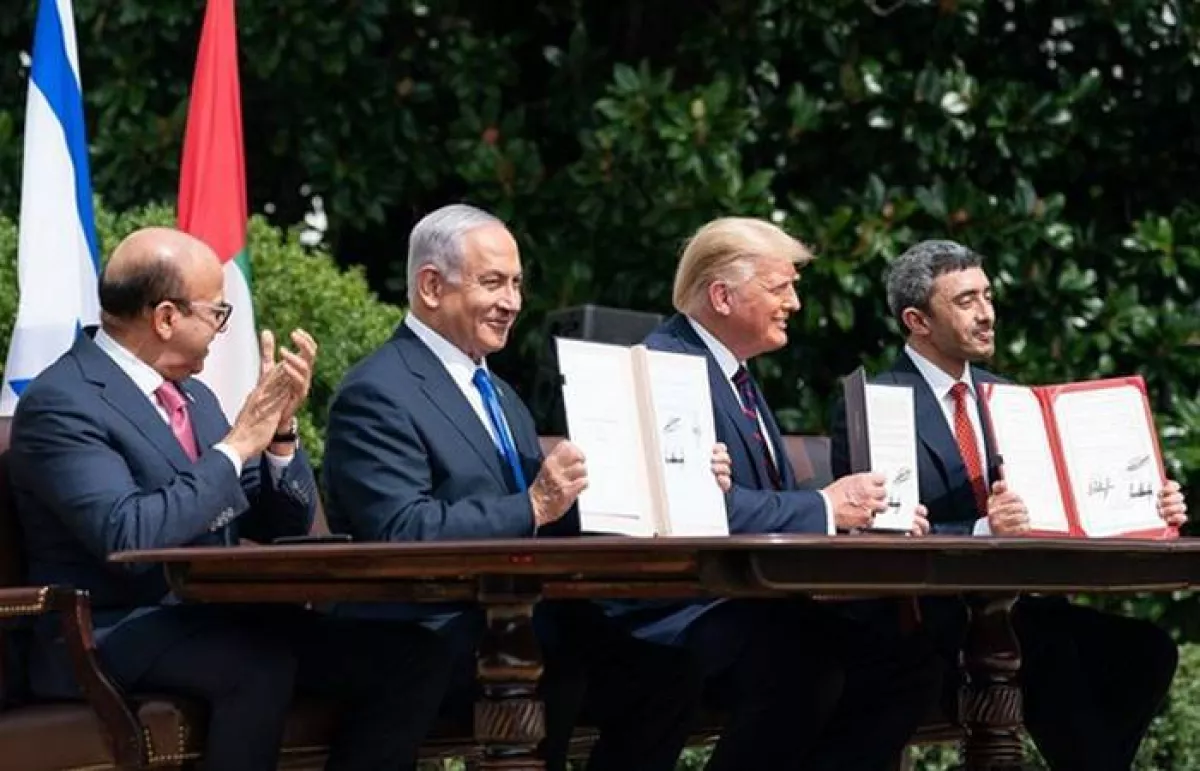Baku and Washington: rapprochement on the Middle Eastern track Expert opinions on Caliber.Az
The administration of U.S. President Donald Trump is actively discussing the possibility of involving Azerbaijan and several Central Asian countries in the Abraham Accords, hoping to deepen their relations with Israel, writes The Times of Israel.
Under the Abraham Accords, signed during Trump’s first presidential term, four Muslim countries agreed to normalise diplomatic relations with Israel through U.S. mediation.

“Azerbaijan and every country in Central Asia, by contrast, already have longstanding relations with Israel, meaning that an expansion of the accords to include them would largely be symbolic, focusing on strengthening ties in areas like trade and military cooperation [...]
While Trump officials have publicly floated several potential entrants into the accords, the talks centered on Azerbaijan are among the most structured and serious, the sources said. Two of the sources argued a deal could be reached within months or even weeks,” the publication notes.
Trump’s Special Representative for Peace Negotiations, Steve Witkoff, visited Baku in March for a meeting with Azerbaijani President Ilham Aliyev.
Caliber.Az invited well-known political commentators to comment on the prospects this holds for Azerbaijan, Israel, and the Central Asian countries.

Israeli analyst and journalist Mikhail Gurevich, who runs the Telegram channel Kolya Khadashot, believes that the accession of Azerbaijan and the Central Asian countries to the Abraham Accords would be symbolic first and practical second.
“This is because, unlike the United Arab Emirates, Bahrain, and other countries that joined the Abraham Accords earlier, the Central Asian states and Azerbaijan already have diplomatic relations with Israel—relations that have been developing with varying degrees of success.
Israel's ties with Azerbaijan are particularly close. But it's worth noting that, for example, even with Kazakhstan, economic relations—especially in the energy sector—are quite robust, though not as extensive as with Azerbaijan. Today, joining the Abraham Accords would primarily offer these countries more opportunities and greater prospects for cooperation with the United States. The Trump administration is clearly a driving force and stakeholder in this process. Consequently, joining the accords would enable both Azerbaijan and the Central Asian states to engage more closely with the U.S. and potentially take part in mutually beneficial economic and perhaps even defence programmes. That’s where their direct interest lies,” the expert noted.
As for who might oppose this process, Gurevich notes that the main actors are China—in the case of Kazakhstan—and Iran—in the case of both Kazakhstan and Azerbaijan.
“For Iran, any strengthening of alliances between the Central Asian and Caucasus states with Israel and the United States is essentially seen as a hostile act. Naturally, Tehran will do everything in its power to counter this.
Let me emphasise again: when we speak of reviving the Abraham Accords, the primary focus is on normalising relations with Saudi Arabia, Mauritania, and potentially even discussing certain defence issues with Syria. And Azerbaijan, too, could undoubtedly benefit from this process. It is already known that energy supplies from Azerbaijan to Syria have begun. The Abraham Accords could provide additional momentum to such developments,” Gurevich believes.

For his part, Ilgar Velizade, an expert on international affairs and head of the “South Caucasus” Political Scientists’ Club, stated that it would indeed be a very significant decision if Azerbaijan chooses to join the Abraham Accords.
“The Abraham Accords are not merely about establishing relations with Israel—they represent a broader framework for shaping a new Middle Eastern agenda, one that prioritises the peaceful coexistence of states with different political systems, particularly between Arab and Muslim nations and Israel.
Within this new policy architecture, Azerbaijan is assigned a special role. It should also be noted that the Abraham Accords are a product of U.S. political strategy. Behind the establishment of ties between Israel and the Arab states within the framework of the Accords, one can clearly see the interests of the United States.
The U.S. acts as a sort of moderator of political processes in the region. Through the Abraham Accords, Washington gains the ability to influence regional developments. As is well known, Israel is a strategic ally of the United States in the Middle East. Hence, the U.S. shows keen interest in integrating Israel—and, in essence, its own strategic interests—into a new regional strategy or framework of relations. This is the guiding rationale behind U.S. actions,” the analyst explained.
“We have our own interests and long-standing relations with Israel,” Velizade continued, “grounded in mutual recognition and the implementation of numerous joint projects in both the economic and military-technical spheres.
Israel has long been a close and trusted partner of Azerbaijan. Therefore, for us, participation in the Abraham Accords would merely formalise an already existing system of cooperation—one in which Israel plays a key role. And this wouldn’t be about Azerbaijan trying to please anyone, but rather a logical continuation of the development of Azerbaijani-Israeli relations. Incidentally, a number of countries that signed the Abraham Accords—such as the United Arab Emirates—are also strategic partners of Azerbaijan.
So, in this respect, there are no serious obstacles for Azerbaijan. However, we must consider the processes currently unfolding in our region and the broader Middle East.
The situation in Gaza is highly complex and contradictory. A number of Arab states have in fact paused their participation in the Abraham Accords until the Gaza issue is resolved.
I believe the Azerbaijani side—while continuing to develop its bilateral cooperation with Israel—will likewise hold off on joining the Abraham Accords for now, at least until a more favourable political environment emerges and the regional situation stabilises,” the expert concluded.
As for the Central Asian states, Velizade added, their position is broadly similar—if not more pronounced.
“They do not conceal the fact that their potential participation in the Abraham Accords and further cooperation with Israel is directly linked to resolving the Palestinian issue. They speak openly about it. Leaders of virtually all Central Asian countries have expressed their views on this matter, specifically insisting on the implementation of the two-state solution—Palestine and Israel.
I believe that under current conditions, with the situation still far from stabilised, it is premature to speak of full participation by Central Asian states or Azerbaijan in the Abraham Accords. However, if circumstances change and more favourable conditions emerge, such participation is entirely possible and achievable. It would not only strengthen ties between Israel and the countries of the region but also contribute to shaping a new geopolitical agenda in and around the Middle East,” Velizade concluded.








